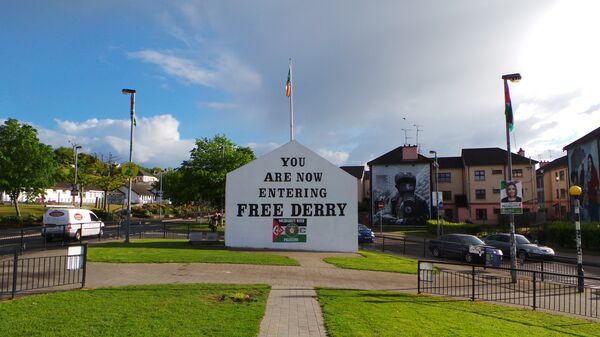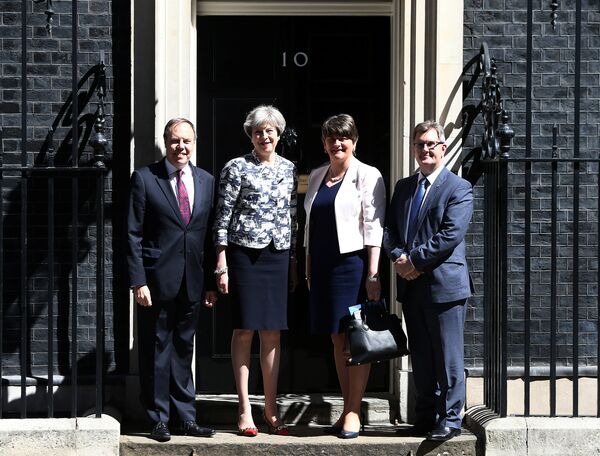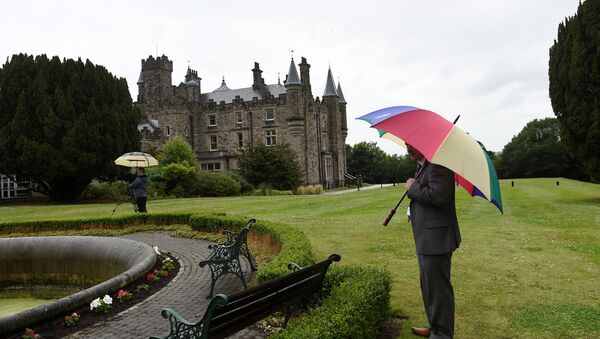Northern Ireland Secretary James Brokenshire, who had to return to London to vote on the Queen's Speech on Thursday (June 29), returned to Belfast on Friday (June 30) for more talks.
SofS @JBrokenshire:"I believe that a resolution can be found": https://t.co/Rx75mGWRAh pic.twitter.com/4ENyWiRJc7
— NIO (@NIOPressOffice) 29 June 2017
He had originally set a deadline for 4pm on Thursday but he extended that deadline.
Mr. Brokenshire is set to make a statement before MPs at Westminster on Monday (July 3) and one of the options on the table is to institute direct rule of the province from London.
Between 1972 and 1998, as "The Troubles" raged, London ruled Northern Ireland directly but after the Good Friday Agreement the Northern Ireland Executive was instituted with a First Minister, from the unionist community, and a Deputy First Minister, from the (Irish) nationalist community.

But it would involve emergency legislation and would also encourage small, but dangerous dissident Irish republican groups who are itching to find an excuse to restart the "armed struggle."
Another option would be to call fresh elections for the Assembly at Stormont but there is little appetite for another poll among a fatigued electorate.
The DUP and Sinn Fein have both blamed each other for the failure to reach an agreement.
.@conormurphysf speaking earlier on demand for Acht na Gaeilge pic.twitter.com/p1B91qfuPf
— Sinn Féin (@sinnfeinireland) 29 June 2017
One of the main sticking points is believed to be an Irish Language Act (Acht na Gaeilge), which Sinn Fein is insisting on.
The ancient Irish language is only spoken by a small minority in Northern Ireland but it is vital to the Irish identity.
"It is our request on behalf of the people that we represent, it's the request of other parties here as well, it's the position of the Irish government that they want to see a stand-alone, rights-based Irish language act," Sinn Fein's Conor Murphy said.
But DUP leader Arlene Foster is on record as having said this would not be introduced "on her watch."
It was thought at one point that one way around the gridlock would be for Sinn Fein to accept legislation which also protected Ulster Scots, a dialect used by an even smaller minority in the Protestant community.
Dr. Katy Hayward, a senior lecturer in social division and conflict at Queen's University in Belfast, said even the name, the Irish Language Act, was a stumbling block, with the DUP preferring a different title as well as the inclusion of the Ulster Scots tongue in it.
"The Irish Language Act was in the annex of the St. Andrews Agreement in 2006 so it is there and Sinn Fein are in a strong position in arguing for it," she told Sputnik.
"Arlene Foster said it would not come in on her watch and she was taking a very hard line at the end of last year and the beginning of this year while Sinn Fein say there will be no return to the status quo and have refused to serve under her. But if devolution is going to be restored they are both going to have to lose face," Dr. Hayward told Sputnik.
She said if direct rule from London was imposed it would play into the hands of dissident Irish republicans.
"There is always a risk of return to conflict in Northern Ireland. When the impression is given that the democratic institutions are not working, it plays into the hands of those who want those institutions to fail. The DUP's Edwin Poots said on Thursday that he would prefer direct rule ministers to take over Stormont ministries if we don't have a deal soon. This implies a wavering commitment to devolution that does not bode well for these negotiations," Dr. Hayward told Sputnik.
Marie Curie statement on the breakdown of @niassembly negotiations pic.twitter.com/ZSDDslLn83
— Marie Curie NI (@MarieCurieNI) 30 June 2017
Earlier the DUP signed a "confidence and supply" deal with the Conservative government, which many critics say fatally undermines London's role as an impartial arbiter, as laid down in the Good Friday Agreement.
Sinn Fein certainly believes the DUP's cozy relationship with the Tories at Westminster has further poisoned relations between the two major parties in Northern Ireland.
"The (Conservative) alliance with the DUP has emboldened their anti-rights and anti-equality agenda, has increased their intransigence and that isn't acceptable or sustainable," Mr. Murphy said.

Under the deal signed in Downing Street on Monday, Theresa May's government can rely on the support of the 10 DUP 10 MPs to pass legislation.
Earlier this year the then Deputy First Minister, Martin McGuinness, stood down in protest after Mrs. Foster refused to step down after she was criticized for her handling of a renewable heating scheme.
The scheme was Mrs. Foster's brainchild when she was the province's Minister for Enterprise, Trade and Investment but it has been a fiasco which has cost the taxpayer an extra £400 million (US$518 million).
Mr. McGuinness, a former Irish Republican Army (IRA) commander, died in March and was succeeded as Sinn Fein leader by Michelle O'Neill, but she has maintained his position that Sinn Fein will not serve under Mrs. Foster until an inquiry has concluded into the renewable heating scheme.
But the DUP has refused to sacrifice Mrs. Foster as leader, partly out of stubbornness and because many DUP voters would be unhappy with what would be perceived to be taking orders from the former political wing of the IRA.


